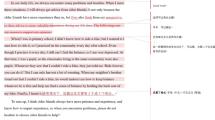Abstract
Currently, much attention has been paid to the online intelligent grading system widely used in college English writing teaching. In an effort to make the best use of the system, the article conducted an empirical study of applying the system to college English writing teaching. The findings are: 1) the intelligent grading system does work efficiently in college English writing teaching, however, it needs to be optimized in assessing the students’ writing texts and providing related feedback; 2) it is necessary to combine with teacher-assisted feedback and supervision on the basis of the intelligent grading system.
Access this chapter
Tax calculation will be finalised at checkout
Purchases are for personal use only
Similar content being viewed by others
References
Warschauer, M., Ware, P.: Automated writing evaluation: defining the class room research agenda. Lang. Teach. Res. 10(2), 1–24 (2006)
Shermis, M.D., Koch, C.M., Page, E.B., Keith, T.Z., Harrington, S.: Trait ratings for automated essay grading. Educ. Psychol. Meas. 62(1), 5–18 (2002)
Page, E.: Project essay grade: PEG. In: Shermis, M., Burstein, J. (eds.) Automated Essay Scoring: A Cross-Disciplinary Perspective, pp. 43–54. Erlbaum, Mahwah (2003)
Liang, M.: Constructing a Model for the Computer-assisted Scoring of Chinese EFL Learners’ Argumentative Essays. Foreign Language Teaching and Research Press, Beijing (2011)
Attali, Y.: Exploring the feedback and revision features of criterion. J. Second Lang. Writ. 14, 191–205 (2004)
Warschauer, M., Grimes, D.: Automated writing assessment in the classroom. Pedagog.: Int. J. 3(1), 22–36 (2008)
Grimes, D.: Assessing automated assessment. ftp://ftp.ics.uci.edu/pub/grimesd/AutoAssessment.pdf. Accessed 20 June 2010
Attali, Y., Bridgeman, B., Trapani, C.: Performance of a generic approach in automated essay scoring. J. Technol. Learn. Assess. 10(3), 4 (2010)
Liang, M., Wen, Q.: A critical review and implications of some automated essay scoring systems. Comput.-Assist. Foreign Lang. Educ. 5, 18–24 (2007)
Ge, S., Chen, X.: Automated essay scoring for Chinese EFL learners. Foreign Lang. World 5, 43–50 (2007)
Shermis, M.D.: Automated essay scoring. Turk. J. Distance Educ. 1, 49–59 (2006)
Hoon, T.: Online automated essay assessment: potentials for writing development (2006). http://ausweb.scu.edu.aw06/papers/refereed/tan3/paper.html. Accessed 09 Aug 2010
Scharber, C., Dexter, S., Riedel, E.: Students experiences with an automated essay scorer (2008). http://escholarship.bc.edu/cgi/viewcontent.cgiarticle=1116&context=jtla. Accessed 10 Nov 2009
Yang, et al.: A review of strategies for validating computer-automated scoring. Appl. Meas. Educ. 15(4), 391–412 (2002)
Ericsson, P.F.: The meaning of meaning: is a paragraph more than an equation? In: Ericsson, P.F., Haswell, R.H. (eds.) Machine Scoring of Student Essays: Truth and Consequences, pp. 28–37. Utah State University Press, Logan (2006)
Lavolette, E., Polio, C., Kahng, J.: The accuracy of computer-assisted feedback and students’ responses to it. Lang. Learn. Technol. 19, 50–68 (2015)
Acknowledgement
This work was supported by the Preparatory Research of Special Topics: Anti-epidemic and resumption, 2020 Zhejiang Education Scientific Planning Program, and the 10th National Foreign Language Education Program (grant no. ZGWYJYJJ10A057).
Author information
Authors and Affiliations
Editor information
Editors and Affiliations
Rights and permissions
Copyright information
© 2021 Springer Nature Switzerland AG
About this paper
Cite this paper
Juan, S., Li, C., Saiyun, Z., Xianwu, Z. (2021). Applying the Online Intelligent Grading System to College English Writing Teaching: An Empirical Study. In: Pang, C., et al. Learning Technologies and Systems. SETE ICWL 2020 2020. Lecture Notes in Computer Science(), vol 12511. Springer, Cham. https://doi.org/10.1007/978-3-030-66906-5_27
Download citation
DOI: https://doi.org/10.1007/978-3-030-66906-5_27
Published:
Publisher Name: Springer, Cham
Print ISBN: 978-3-030-66905-8
Online ISBN: 978-3-030-66906-5
eBook Packages: Computer ScienceComputer Science (R0)




